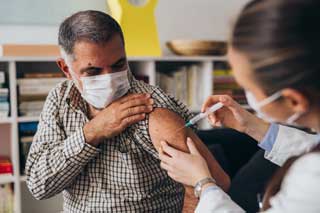Michigan Bishops Share Moral Considerations Regarding COVID-19 Vaccines

- Moral Considerations Regarding COVID-19 VaccinesDownload PDF
- Consideraciones Morales Sobre las Vacunas Para el COVID-19Download PDF
Dear Sisters and Brothers in Christ,
Peace be with you!
In these Advent days of preparation for the coming of our Lord, we hope and pray that the Prince of Peace may console you and draw you to himself. Over this past year the struggles with the global COVID-19 pandemic have weighed heavily on our hearts, yet our Lord has been with us to deepen our faith and trust in him. Know of our prayers for you and for all health care workers who are so diligently caring for those who are ill.
As vaccines for COVID-19 are now becoming available, we wish to address the moral questions that have arisen, insofar as some vaccines are developed using cells lines that have originated from the tissue taken from babies who were aborted decades ago.1 Abortion is a grave evil, and we must avoid complicity in abortion. Let us also pray for God’s peace, healing, and mercy for all those who have had abortions.
At the time of this writing, the Food and Drug Administration has given approval for the emergency use of the COVID-19 vaccine developed by Pfizer. Two other vaccines, one developed by Moderna and the other developed by AstraZeneca, might also gain FDA approval.2
It is morally permissible to receive the vaccines developed by Pfizer and Moderna. Neither of these vaccines have used cell lines originating in tissue taken from aborted babies in their design, development, and production. However, both the Pfizer and the Moderna vaccine did use such a cell line in the confirmatory testing. This connection to the abortion is very remote, however, and it is important to keep in mind that there are varying levels of responsibility. Greater moral responsibility lies with the researchers than with those who receive the vaccine. The Congregation for the Doctrine of the Faith has indicated that it is morally permissible to be vaccinated if there are no alternatives and there are serious health risks.3 Such serious health risks are present due to the current pandemic.
The vaccine developed by AstraZeneca is more morally problematic, however. It did utilize in the design, production, development, and confirmatory testing a cell line that originated from tissue taken from an aborted baby. This vaccine may be received only if there are no other alternatives. If one does not have a choice of vaccine and a delay in immunization may bring about serious consequences for one’s health and the health of others, it would be permissible to accept the AstraZeneca vaccine. It is somewhat similar in production to the Rubella vaccine, which the Pontifical Academy of Life indicated could be received for grave reasons and if there are no other alternatives.4
If one were to choose not to be vaccinated, one would have a moral responsibility to embrace the necessary precautions to avoid spreading the disease to others.
At this same time, we join our voices to call for the development of vaccines that have no connection to abortion. Our consciences must not be dulled, nor may we imply in any way that abortion is acceptable.
Let us implore the intercession of the Blessed Virgin Mary, that God may bring an end to the pandemic and that all esteem and respect the dignity of human life.
- Most Reverend Allen H. Vigneron
Archbishop of Detroit - Most Reverend Earl A. Boyea
Bishop of Lansing - Most Reverend Paul J. Bradley
Bishop of Kalamazoo - Most Reverend John F. Doerfler
Bishop of Marquette - Most Reverend Robert D. Gruss
Bishop of Saginaw - Most Reverend Walter A. Hurley
Apostolic Administrator, Diocese of Gaylord - Most Reverend David J. Walkowiak
Bishop of Grand Rapids
- For more on the morality of COVID-19 vaccines, see the joint statement of the chairmen of the USCCB Committee on Doctrine and Pro-Life Activities on which our statement is based
- For more information about specific vaccines being developed for COVID-19 see this reference chart from the Charlotte Lozier Institute
- Congregation for the Doctrine of the Faith, Instruction on Certain Bioethical Questions (Dignitas Personae) (2008), nos. 35–36
- Pontifical Academy for Life, “Moral Reflections on Vaccines Prepared from Cells Derived from Aborted Human Foetuses,” (9 June 2005) in National Catholic Bioethics Quarterly 6:3 (2006): 541–49
